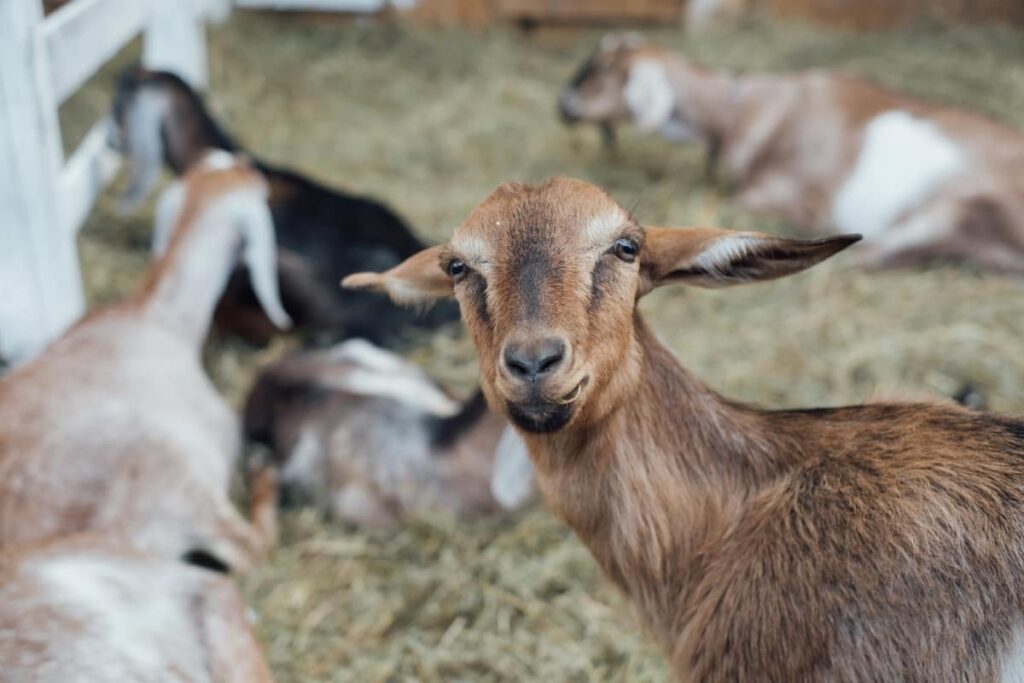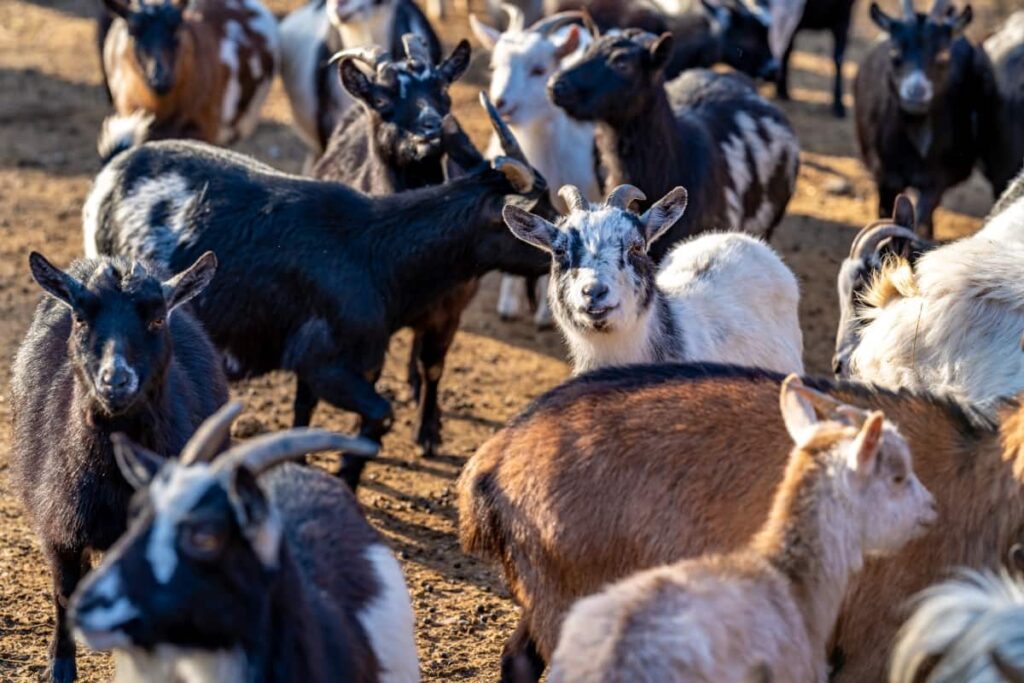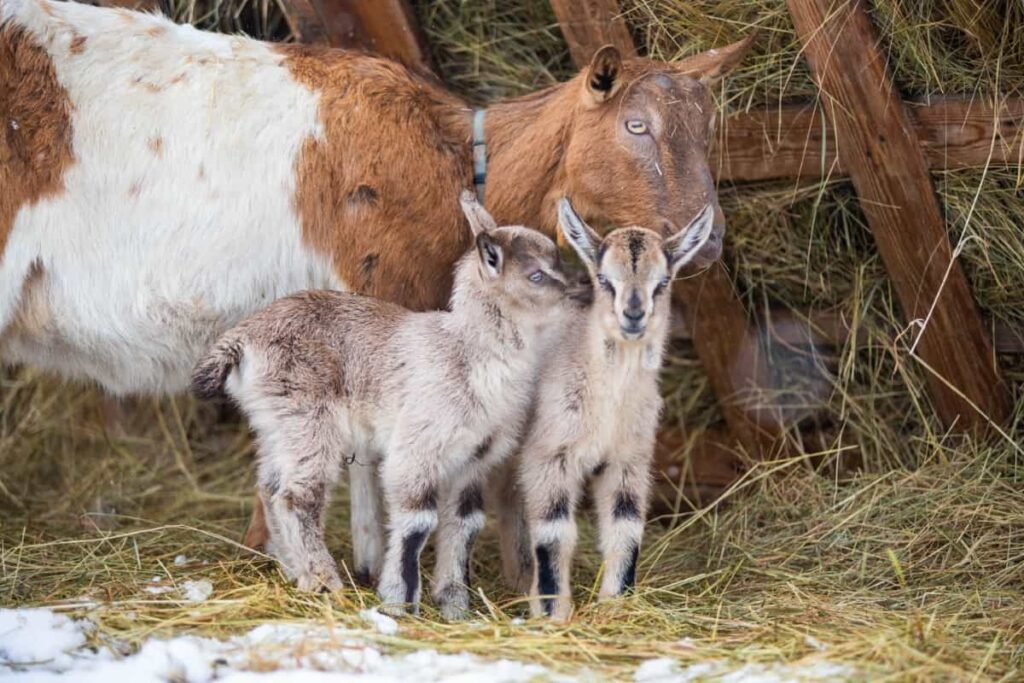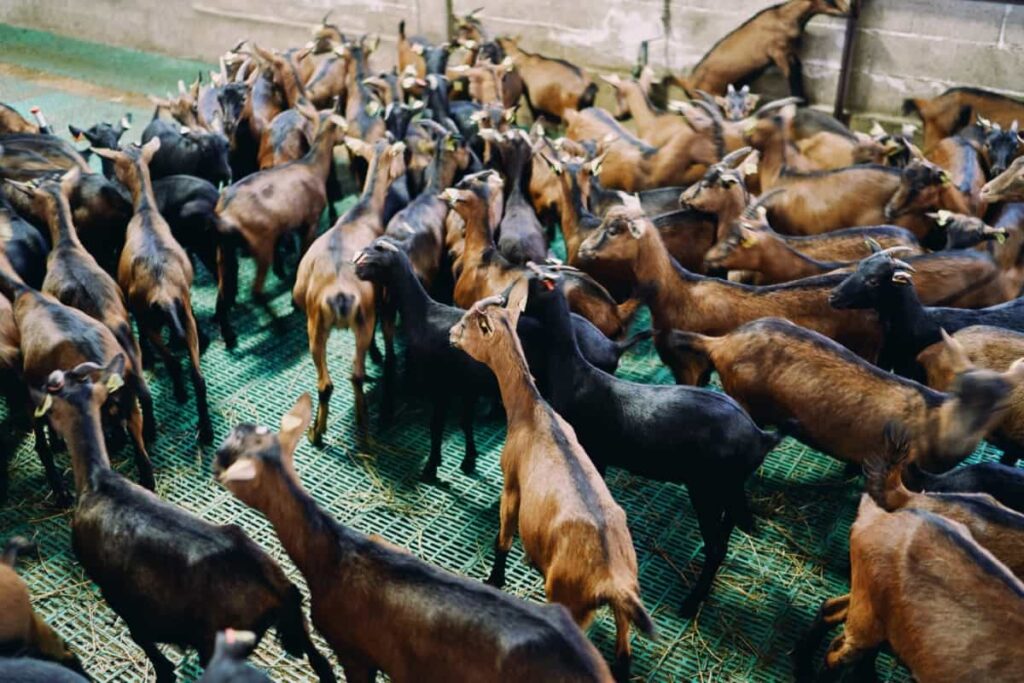Understanding the gestation period of goats is essential for proper breeding practices, ensuring healthy pregnancies and successful births. The gestation period of goats refers to the length of time between conception and birth. It is a crucial phase in the reproductive cycle of goats, during which the fertilized eggs develop into fully-formed kids ready for life outside the womb. This period plays a vital role in goat breeding and livestock management.

Gestation Period of Goats in India
Gestation Period of Goats in India: A Comprehensive Guide
In India, the gestation period for goats can change depending on several factors, such as breed and environmental conditions. During pregnancy, proper care and nutrition play an important role in ensuring the health of the mother goat and the development of her offspring. Providing a nutritious diet can help support healthy growth during this critical period.
Additionally, regular veterinary check-ups are essential to monitor the progress of pregnancy and address any potential issues or complications. Experienced goat breeders or veterinarians can provide specific information related to individual animals’ needs based on their breed and other factors.
Calculating Goat Gestation Period in India
It helps breeders plan for successful pregnancies and anticipate the arrival of adorable kids on their farms. While the average gestation period for goats in India is around 150 days, it’s important to note that this can change depending on factors such as breed and environmental conditions. It’s important to keep in mind that this is just a general guideline, and individual goats may have variations in their gestation periods. Understanding the gestation period of goats allows farmers and breeders to plan breeding activities effectively.
By knowing when breeding took place, they can estimate when kids will be born and make appropriate preparations for their arrival. Therefore, consulting with a veterinarian or experienced goat breeder is essential for accurate information about specific animals and their care. Knowing these approximate timelines allows breeders to determine when they should introduce male bucks for mating and when they can expect new additions to their herd. However, keep in mind that these figures serve as general guidelines and should not be considered absolute.
Understanding the Importance of Goat Gestation Period in Indian Agriculture
Farmers and breeders need to have a clear understanding of this period as it directly impacts their breeding plans and overall productivity. The key importance lies in maximizing breeding efficiency. By knowing the gestation period, farmers can plan their breeding schedules accordingly. This ensures that the goats give birth at optimal times, allowing for efficient management of offspring and better utilization of resources.
Additionally, understanding the gestation period in goats helps with proper care and nutrition during pregnancy. This is crucial for ensuring healthy mothers and robust kids. Adequate feeding practices can be tailored to meet the specific needs of pregnant goats, resulting in improved reproductive success.
In case you missed it: Milking Procedures and Dairy Product Processing in Goat Farming

Moreover, knowledge about the gestation period allows farmers to anticipate labor requirements during the kidding season. They can plan for adequate manpower or seek assistance if needed. This proactive approach reduces stress on both animals and caretakers. Furthermore, an awareness of goat gestation periods contributes to better genetic selection within breeds. Breeders can track individual does’ fertility rates by monitoring their respective gestation lengths over time.
Factors Affecting Goat Gestation Period in India: A Detailed Analysis
Firstly, the breed of the goat plays a significant role in determining its gestation period. Different breeds have different genetic makeup, which can result in variations in their reproductive cycles. Goat breeders need to be aware of the specific gestation periods associated with different breeds.
Environmental conditions also play a crucial role in goat gestation. Factors such as temperature, humidity, and nutrition levels can impact both the mother goat and her developing offspring. Extreme weather conditions or inadequate nutrition may lead to complications during pregnancy or affect the overall health of the kids.
Furthermore, age can affect the length of gestation for goats. Younger does tend to have shorter gestational periods compared to older ones. This is why proper breeding practices involve considering not only genetics but also age when selecting parent goats. The general health and well-being of the mother goat are vital determinants as well. Goats that receive regular veterinary care and are provided with optimal nutrition throughout their pregnancy tend to have more predictable and healthy pregnancies.
Goat Gestation Period Calendar: A User-Friendly Tool for Goat Breeders in India
Planning for breeding goats requires careful consideration of the gestation period, as it directly affects the timing of breeding, pregnancy, and, ultimately, the birth of adorable kids. This calendar provides valuable information about the stages of pregnancy and corresponding weeks of gestation. Understanding these stages can help breeders monitor their goats’ progress and ensure optimal care throughout each phase.
By utilizing this handy Goat Gestation Period Calendar alongside regular veterinary guidance and care practices tailored for individual animals and breeds, goat breeders in India can enhance the efficiency of their breeding programs while ensuring healthier outcomes for both mother goats and their precious offspring.
| Weeks of Gestation | Stages of Pregnancy |
| 1-4 | Embryonic Period |
| 5-8 | Fetal Period |
| 9-12 | Growth Period |
| 13-14 | Late Gestation |
| 15 | Birth |
Accurately Predicting Goat Gestation Period in India: The Role of Modern Technology
Traditionally, breeders relied on manual observation and calculation to estimate when their goats would give birth. However, modern technology has revolutionized this process, making it more accurate and efficient. One such technological advancement is ultrasound imaging. By using ultrasound machines specifically designed for veterinary use, breeders can now visually inspect the reproductive organs of a pregnant goat and determine the stage of pregnancy with great precision.
This allows them to predict the gestation period and plan accordingly accurately. Another valuable tool is progesterone testing kits. These kits measure the levels of progesterone hormone in a doe’s blood or milk sample. Progesterone levels fluctuate during different stages of pregnancy, providing valuable insights into timing and progress. Breeders can monitor these levels regularly to pinpoint exactly when their goats will give birth.
In case you missed it: Managing Parasites in Goats: Prevention, Diagnosis, and Treatment

Additionally, there are smartphone applications available that help track a goat’s breeding history and calculate estimated due dates based on previous pregnancies. These apps take into account factors like breed-specific information and environmental conditions to provide accurate predictions.
Goat Gestation Period in India: A Comparative Study of Different Goat Breeds
When it comes to goat breeding in India, understanding the gestation period of different goat breeds is crucial for successful reproduction. Each breed has its unique requirements during pregnancy, which makes a comparative study essential.
| Goat Breed | Gestation Period (Days) |
| Jamunapari | 150-155 |
| Sirohi | 145-150 |
| Beetal | 148-152 |
| Barbari | 147-151 |
| Osmanabadi | 145-150 |
While these are general guidelines based on breed averages, it’s important to note that individual variations can occur within each breed. Consulting with experienced goat breeders or veterinarians can provide more specific information tailored to your animals’ needs.
The Impact of Nutrition on Goat Gestation Period in India: A Nutritional Perspective
During pregnancy, a goat’s nutritional needs increase as she supports the growth and development of her offspring. It is essential to provide adequate amounts of high-quality feed to ensure optimal health for both the mother goat and her kids. A diet rich in vitamins, minerals, and energy is necessary for maintaining good reproductive performance in goats.
Proteins are especially important during early pregnancy when embryonic development takes place. They aid in muscle and tissue growth. Minerals are vital for bone formation in developing kids. Deficiencies can lead to weak bones or even stillbirths. Vitamins such as vitamin E help support the immune system during this critical time.
In addition to providing proper nutrition, it is also important to monitor body condition throughout gestation. Overfeeding may result in excessive weight gain, which can lead to complications during delivery. On the other hand, underfeeding can negatively impact fetal growth and development. Consulting with a veterinarian or an experienced goat breeder can provide valuable guidance on formulating an appropriate diet plan based on individual goat requirements.
In case you missed it: Government Subsidy for Goat Farming in Himachal Pradesh: Eligibility, Documents, and Application Process

Conclusion
The gestation period of goats plays a vital role in the world of goat farming. It is a crucial time during which the mother goat carries and nurtures her offspring. Understanding and monitoring the gestation period is essential for successful breeding and ensuring healthy outcomes.
- Types of Grass Growing for Goat Farm
- How to Train Goats for Milking: A Beginners Guide
- Goat Milking Practices and Equipment: A Beginner’s Guide
- Goat Farming for Fiber: Producing Mohair and Cashmere
- Maximizing Goat Milk Production: Tips for Dairy Goat Farmers
- Goat Farming as a Family Business: Strategies for Success
- Profitable Kenya Goat Breeds for Commercial Dairy and Meat Business
- Unlock the Secrets of Oberhasli Goat: Discover Raising and Management Practices
- Ultimate Guide to Myotonic Goats: Explore Profile to Raising